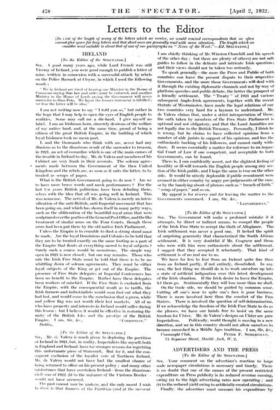I To ate Editor of the. SPECTATOR.] - Mr. de
Valera is touch given to deploring the partition of Ireland in 1921, but, in reality, Imperialists like Myself, both in England and Ireland, have far stronger reasons for regretting this unfortunate piece of Statecraft. But for it, and the con- sequent exclusion of the loyalist vote of Northern Ireland, Mr. de Valera would not have had the smallest 'chance of being returned to office on his present policy ; and litany other misihrtunes that have overtaken Ireland---from the disastrous civil war of 1922-24-to the nuisance of the Customs Border -
would not have Occurred: •
. The past cannot now be undone, and the only moral. I wish to draw la that franiers- of the Partition (and at the nwenent I R111 chiefly thinking of Mr. Winston Churchill and his speech of the other day ; but there are plenty of others) are not safe guides to follow in the -delicate and intricate Irish. question ; •
and their views should not be taken too seriously. ,
- To .speak generally—the more the Press and Public-of both, countries can leave the present dispute to their respective Covertunents, and the more those Governments wilt-deal with it through the existing diplomatic channels and not-byway of platform speeches and public debate, the *Der the prospect of a friendly settlement. TIM `I'reaty " 1921 and various subSeqUent Anglo-Irish agreements, together with the incest Statute of Westminster, have made the. legal relations of our two countries very hard for a layman to understand..
de Valera claims that, under a strict interprctatiOn'oeihese, the oath taken by members of the Free State Parliament is optional and not obligatory, and that the Land AmMities are not legally due to the British Treasury. Personally, I think he is wrong, but he claims to have collected opinions 'from a number of able jurists in support of his opinions, and has the enthusiastic backing of his followers, and cannot easily with- draw. • It scents essentially a matter for reference to an impar- tial Court of Law if one competent, and acceptable to both Governments, can be found.
There is, I cats confidently assert, not the slightest feeling 41' hostility or towards the English people among any sec- tion of the Irish public, and I luMe the same is true on the other side. It would be utterly deplorable if public resentment were aroused in either country by angry pM-judgements of the ease, or by the bandying about of phrases such as " breach of faith," " scrap of paper," and so on.
My appeal is for n1Serve and for leeVing the matter to the. Governments concerned.---I ant, Sir. &e..
LEINSTERIVIAN.'
































 Previous page
Previous page